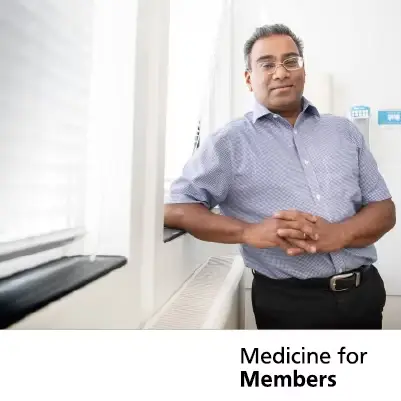As September is Prostate Cancer Awareness Month, we took the opportunity to speak to Bría McAllister, a Urology Nurse Practitioner with a specialist interest in prostate cancer. Bría has worked in Urology since 2004, initially in Glasgow and now at Nottingham University Hospitals NHS Trust (NUH).
Bría presented at our Play Domino Talk Prostate event back in December 2022 - a community engagement event organised by our United Against Prostate Cancer Project.

Hi Bría. Can you tell us about your role?
As part of my role, I facilitate the Prostate Cancer Assessment Pathway at NUH.
This is a nurse-led service where we look after the patient at all stages - from initial referral to prostate MRI, LATP biopsy and any further investigations they may have.
Patients with benign (non-cancerous) outcomes are discharged with a follow-up plan. Patients with a cancer diagnosis will be sent on to a consultant-led clinic.
The first time one of our patients will meet their consultant team, they have a full package of investigations, including biopsy results, so that their team can make a tailored care plan for them.
Who is most at risk of developing prostate cancer? What are some of the risk factors?
Anyone born with a prostate is at risk of developing prostate cancer, and it is a disease that will affect 1 in 8 men over their lifetime.
However, that risk is doubled for men with a family history of prostate cancer in a first-degree relative (brother or father), or men from African-Caribbean ethnicities. In these groups, 1 in 4 can expect to be affected by prostate cancer.
Unfortunately, prostate cancer is a silent disease, meaning that it does not display any symptoms until it has become advanced.
It is important, therefore, that men have conversations with their healthcare providers to access PSA testing which can help identify prostate changes before they develop too far.
Can you tell us about some of the work you have done with BME communities?
In collaboration with the excellentRose Thompson Foundation (opens in a new tab) (formerly B’Me Against Cancer), and Nottingham University Hospitals NHS Trust, I developed a prostate cancer risk assessment service which specifically targeted men of African-Caribbean background.
The clinics were held in community-owned centres where attendees were used to socialising and felt at home. It was very important to us that our attendees felt comfortable and welcome, as we didn’t want to become another cold clinic.
Our clinics were staffed both by hospital staff and by community volunteers, and was a wonderful exercise in collaboration.
During the lifetime of the service, we saw, counselled and tested over 350 men, and went on to diagnose over 20 prostate cancers.
The service was very successful, and diagnosed a significant number of cancers which may otherwise have developed unchecked.
What's next for you?
I am about to go on a secondment to do a PhD Fellowship at the University of Leicester in association with the Wellcome Trust. This will look at the impact of ethnicity on lung cancer. A bit of a break from prostate, but with the focus squarely on how cancer affects different ethnic groups, it still answers my professional interests.
What are you key messages to anyone who could be at higher risk of developing prostate cancer?
Start a conversation with your GP. They are your access point to testing and early diagnosis.
Anybody who is in a high risk group should begin having annual PSA tests after their 45th birthday, and all men should have an annual test once they turn 50.
The lack of a national screening programme can cause some confusion in accessing testing. Having open and clear conversations with your doctor is key to managing your risk.
Dominoes and DNA — watch a short video about a prostate cancer awareness raising event held by NHS East Genomics
Link: https://www.youtube.com/watch?v=CZpn6K-_tdA






